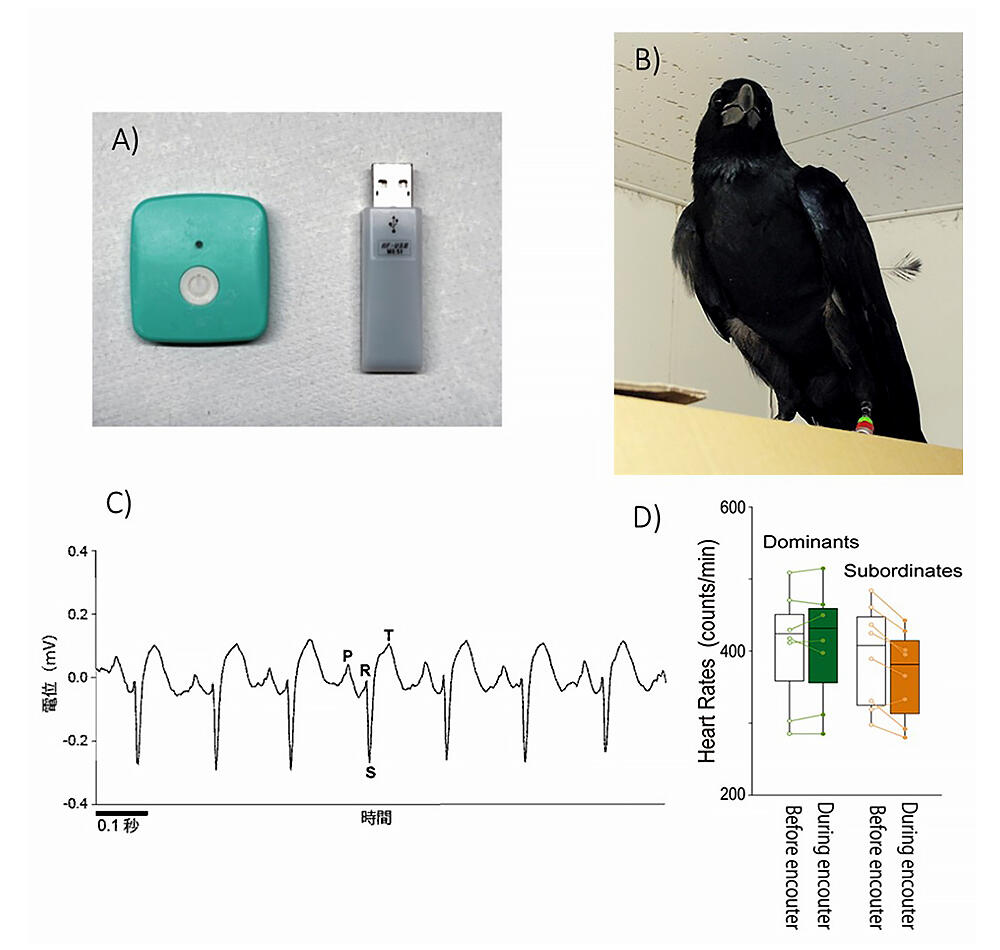The research group of graduate students Kazuaki Takeda and Nana Takashi of the Graduate School of Human Relations, Keio University, along with Professor Ei-Ichi Izawa of the Faculty of Letters, Keio University, established a detachable wireless electrocardiograph recording technology, and, in their laboratory, recorded and analyzed the cardiac potentials of pairs of large-billed crows with a dominant/subordinate relationship in direct encounters while the birds were unrestrained and had free movement. The research group found that subordinate (weak) males faced with dominant males experienced parasympathetic activity and a decrease in their heart rate, while the heart rate of the dominant males remained unchanged and sympathetic activity occurred.

B) A crow being fitted with a custom-made jacket. The small transmitter was attached to the chest skin of the crow.
C) ECG waves successfully recorded from a behaving crow. P-R-S-T components represent single ECG wave.
D) Heart rate change of dominant (green) and subordinate (orange) crows encountering subordinates and dominants, respectively. Subordinates showed the decrease of heart rates but dominants did not.
Provided by Keio University (Photograph in (b) taken by Professor Ei-Ichi Izawa)
Until now, brain research on the function of emotion in animals (known as feelings in humans) has progressed, but research on the body (heartbeat and gastrointestinal discomfort, etc.), which is equally important, has not. As such, the research group analyzed electrocardiograms of pairs of crows interacting with each other, taking advantage of the dominant/subordinate (strong/weak) relationships that males establish with each other.
First, a detachable wireless electrocardiogram was attached to crows' chests, and a vest was developed to prevent the crows from removing it, thus creating the world's first experimental system for recording electrocardiograms from free-ranging crows. Using this system, the researchers conducted an experiment in which a pair of male crows (eight pairs in total) that had formed a dominant/subordinate relationship were brought face to face in a laboratory and allowed to act freely for five minutes. Based on the cardiac potential data for the five minutes before and the five minutes during face-to-face contact, the heart rate per minute and the activity balance of the autonomic nerves (sympathetic and parasympathetic nerves) were examined using heart rate variability analysis methods.
The results showed that the heart rate of the subordinate males decreased, and that parasympathetic activity became stronger when they were face-to-face with the dominant male. On the other hand, the dominant male's heart rate remained unchanged, and their sympathetic activity became stronger. These results indicate that different physical responses occur in crows depending on their relationship with their mates. In particular, studies on humans and rodents have suggested that a decrease in heart rate accompanied by strong parasympathetic activity is a physical response that occurs with negative emotions such as aversion and fear. Thus, the physical responses occurring in the subordinate males indicate that negative emotions such as "hate" and "fear" may be generated in response to the dominant males.
Izawa stated, "Emotions and affects, whether pleasant or unpleasant, have evolved in diverse forms in various animals as a function of the mind in communicating with others. The results of this study provide a new opening in avian research to view emotions and feelings from the perspective of the body. In the future, we would like to clarify how the responses generated by the body are used in the crows' brains (crows are descendants of dinosaurs) to produce their complex cognition and emotions, and to use their brain and body functions to understand their skillful communication."
Journal Information
Publication: Royal Society Open Science
Title: Social encounters produce different autonomic response between dominants and subordinates in crows
DOI: 10.1098/rsos.220972
This article has been translated by JST with permission from The Science News Ltd.(https://sci-news.co.jp/). Unauthorized reproduction of the article and photographs is prohibited.




